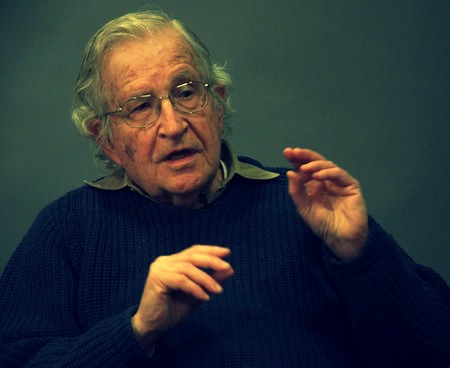
Noam Chomsky Explains Where Artificial Intelligence Went Wrong | Open Culture
While popularly known for his piercing and relentless critiques of U.S. foreign policy and economic neoliberalism, Noam Chomsky made his career as a researcher and professor of linguistics and cognitive science. In his 50 years at MIT he earned the appellation “the father of modern linguistics” and—after overturning B.F. Skinner’s behaviorist paradigm—founder of the “cognitive revolution.” But these are labels the self-effacing Chomsky rejects, in his characteristically understated way, as he rejects all triumphalist narratives that seem to promise more than they deliver.
Such is the case with Artificial Intelligence. The term, coined in 1956 by computer scientist John McCarthy, once described the optimism with which the scientific community pursued the secrets of human cognition in order to map those features onto machines. Optimism has turned to puzzlement, ambivalence, or in Chomsky’s case outright skepticism about the models and methodologies embraced by the field of AI.
Never particularly sanguine about the prospects of unlocking the “black box” of human cognition through so-called “associationist” theories, Chomsky has recently become even more critical of the statistical models that have come to dominate so many of the sciences, though he is not without his critics. At an MIT symposium in May of last year, Chomsky expressed his doubts of a methodology Nobel-winning biologist Sydney Brenner has called “low input, high throughput, no output science.”
Recently Yarden Katz, an MIT graduate student in Cognitive Sciences, sat down with Chomsky to discuss the problems with AI as Chomsky sees them. Katz’s complete interview appeared this month in The Atlantic. He also videotaped the interview and posted clips to his Youtube channel. In the clip above, Katz asks Chomsky about “forgotten methodologies in artificial intelligence.” Chomsky discusses the shift toward practical application in engineering and computing technology, which “directed people away from the original questions.” He also expresses the opinion that the original work was “way too optimistic” and assumed too much from the little data available, and he describes how “throwing a sophisticated machine” at the problem leads to a “self-reinforcing” definition of success that is at odds with scientific discovery.
In the clip below, Chomsky discusses a new field in systems biology called “Connectomics,” an attempt to map the wiring of all the neurons in the brain—an endeavor prickly biologist Sydney Brenner calls “a form of insanity.” Katz asks if the “wiring diagram” of the brain would provide “the right level of abstraction” for understanding its workings.
The interview is worth reading, or watching, in full, especially for students of neuroscience or psychology. Chomsky discusses the work of his onetime colleague David Marr, whose posthumously published book Vision has had an enormous influence on the field of cognitive science. Chomsky also praises the work of Randy Gallistel, who argues that developments in cognitive and information science will transform the field of neuroscience and overturn the paradigms embraced by early researchers in AI. While this is an exciting time to be a cognitive scientist, it seems, perhaps, a difficult time to be a proponent of Artificial Intelligence, given the complexities and challenges the field has yet to meet successfully.
Related Content:
Josh Jones is a doctoral candidate in English at Fordham University and a co-founder and former managing editor of Guernica / A Magazine of Arts and Politics.
This content was originally published here.


